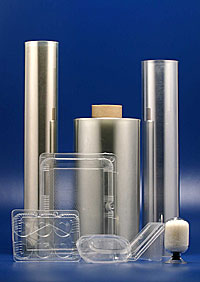Toray Industries, Inc. today announced that it has decided to embark on a full-scale commercialization of the polylactic acid (PLA) films and sheets.
 PLA is an environment-friendly material made from plants. With the company succeeding in solving the quality and cost issues unique to PLA and making it commercially viable, Toray, as a first step, will install a mass production facility for PLA sheet at its South Korean subsidiary and begin full-fledged promotion of Ecodear* film as the group’s universal PLA brand.
PLA is an environment-friendly material made from plants. With the company succeeding in solving the quality and cost issues unique to PLA and making it commercially viable, Toray, as a first step, will install a mass production facility for PLA sheet at its South Korean subsidiary and begin full-fledged promotion of Ecodear* film as the group’s universal PLA brand.
Toray will build a production facility with annual capacity of 5,000 tons of sheet (non-oriented, or NO, film) at Gumi Plant 3 (Imsu-dong, Kyungsangbuk-do) of Toray Saehan Inc. (TSI), its South Korean subsidiary (Headquarters: Seoul, President: Young Kwan Lee, Investment: Toray – 90% Saehan – 10%) for the mass production this time.
The capital investment amounts to about 1 billion yen and the plant is expected to start operations from January 2007. Currently in South Korea, materials used for takeout food containers are being rapidly replaced by biomass plastic. Toray intends to ensure the quick expansion of the business by capturing the pioneering South Korean market through exploitation of advantages in local production while simultaneously promoting new applications in Japan, where the move towards adoption of biomass plastic is gaining momentum.
At the same time, in order to ensure the advancement of PLA film business, Toray will focus on developing highly functional products. The company plans to introduce a series of high value added products into the market by exploiting its “revolutionary nano-alloy technology” that allows combination of multiple polymers on a nano-metric scale and brings out the most optimal characteristics of the material.
In addition to heat and impact resistance equivalent to petroleum-based plastic films, the technology for achieving flexibility and high transparency also has been established, and the company is currently offering the materials and samples for evaluation to its customers. Toray, going forward, will promote adoption of the material in wide-ranging applications from sheets for molding that require heat and impact resistance to films for packaging and industrial uses that require flexibility.
With an eye on the full-scale growth of the PLA film market, Toray plans to prepare itself for a series of production capacity upgrades both in Japan and abroad to expand the business and aims to achieve group sales of 25 billion yen in 2010.
PLA is a plant-based polymer that is manufactured by polymerizing the lactic acid produced by fermenting starch contained in sweet corn and other plants. PLA has great potential as a material with low environmental burden contributing to the prevention of global warming thanks to its “carbon neutral” feature that contributes to controlling green-house gas and conservation of the depleting oil reserves.
In response to the rising oil prices, the material has been rapidly gaining attention not only for its low environmental burden but also for its potential as a low-cost raw material in the future and companies have already started in-depth investigations to introduce PLA in wide ranging fields.
While Toray has already introduced Ecodear* as both fiber and resin products, the company believes the material’s full-scale entry into the film field, where a huge demand is expected in the future, would add momentum to its environment-friendly advanced materials business. The company aims to contribute to improving global environment through promotion of research and development of environment-conscious products as well as development and expansion of its business with focus on “environment, safety and amenity.”
(Cf. news of Aug. 11, 2005.)
Source
Toray pressrelease March 27, 2006.
Share
Renewable Carbon News – Daily Newsletter
Subscribe to our daily email newsletter – the world's leading newsletter on renewable materials and chemicals










